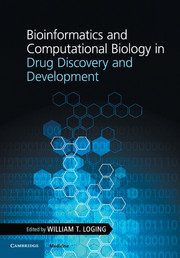Book contents
- Frontmatter
- Contents
- List of contributors
- Foreword: The future of drug discovery and healthcare
- Acknowledgments
- 1 The art and science of the drug discovery pipeline
- 2 Computational approaches to drug target identification
- 3 Understanding human disease knowledge through text mining
- 4 Integrating translational biomarkers into drug development
- 5 Computational phenotypic assessment of small molecules in drug discovery
- 6 Data visualization and the DDP process
- 7 Information visualization – important IT considerations
- 8 Example of computational biology at the new drug application (NDA) and regulatory approval stages
- 9 Clinical trial failures and drug repositioning
- Appendix I Additional knowledge-based analysis approaches
- Appendix II Open source tools and public data sources
- Index
- Plate section
- References
Foreword: The future of drug discovery and healthcare
Published online by Cambridge University Press: 05 February 2016
- Frontmatter
- Contents
- List of contributors
- Foreword: The future of drug discovery and healthcare
- Acknowledgments
- 1 The art and science of the drug discovery pipeline
- 2 Computational approaches to drug target identification
- 3 Understanding human disease knowledge through text mining
- 4 Integrating translational biomarkers into drug development
- 5 Computational phenotypic assessment of small molecules in drug discovery
- 6 Data visualization and the DDP process
- 7 Information visualization – important IT considerations
- 8 Example of computational biology at the new drug application (NDA) and regulatory approval stages
- 9 Clinical trial failures and drug repositioning
- Appendix I Additional knowledge-based analysis approaches
- Appendix II Open source tools and public data sources
- Index
- Plate section
- References
Summary
The era of big data is transforming healthcare
The world we currently live in is unprecedented with respect to the rate of technology expansion and application of these technologies across a hierarchy of health-related problems. Businesses are generating more information, acquiring more data, and aggregating more data on customers than ever before, with the hope that the appropriate analytics applied to these data can inform on all aspects of their product's performance and aid in evolving products and in better targeting of products to specific customer groups. Just as climatologists use big, comprehensive data to predict weather patterns, and quantitative traders on Wall Street use Big Data to assess when to buy and when to sell stocks, so the medical field will soon harness that same power of big data to better understand patient populations, when to treat, and how to treat. However, today, very large-scale data and the integrative analytics that are applied to such data hold no greater promise perhaps than for the healthcare industry. The application of high-throughput informatics technologies to biological problems exemplifies the disciplines of Computational Biology, Bioinformatics, and more recently Clinical Genomics. When one views recent achievements following the hard-won successes of the Human Genome Project and the amount of genomic data being generated on populations of individuals to better understand phenotypic variation in these populations (from disease to the evolutionary architecture of human populations), it is clear that computational tools, advanced algorithms, and a diversity of highly skilled personnel are required to make the most of these data in order to deliver on the promise of the post-genomic era: improved diagnosis, treatment, and prevention of disease.
Understanding disease in a drug discovery setting
Human health is the product of many interacting, deeply complex systems: a person's physiology, their genome and other molecular features, the state of many different types of cells in their body, of their organs, their physical environment, the bacteria and viruses in that environment, their activities, their social interactions, and their medical care. Those who will prevail in the future of developing the most efficacious and safe interventions to treat and prevent disease will be those who can obtain the best data, perform the most informed analyses to identify the patterns associated with disease and wellness, and build the most predictive models based on those patterns – where others may see only noise.
- Type
- Chapter
- Information
- Publisher: Cambridge University PressPrint publication year: 2016



